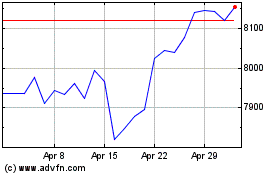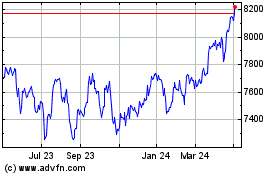Global Stocks Drop as Turmoil Grips Oil Market -- Update
April 21 2020 - 2:50AM
Dow Jones News
By Frances Yoon and Caitlin Ostroff
International stocks fell after U.S. crude-oil futures plunged
below zero for the first time in the latest bout of market
turbulence sparked by the global coronavirus pandemic.
Futures for the S&P 500 futures pared earlier losses Tuesday
to trade 0.2% lower.
The pan-continental Stoxx Europe 600 was down 1% and the U.K.'s
FTSE 100 fell 1.2%.
By early afternoon in Hong Kong, the city's Hang Seng Index fell
2%. South Korea's Kospi Composite was down 1%, Australia's ASX 200
stood 2.2% lower and Japan's Nikkei 225 fell 2%.
The moves tracked Monday's losses on Wall Street, where the Dow
Jones Industrial Average fell 2.4% and the S&P 500 dropped
1.8%.
Yields on the 10-year Treasury note fell to 0.611% from 0.625%
Monday. Bond yields fall as prices rise.
The Australian and New Zealand dollars, two currencies that are
sensitive to moves in commodity prices, weakened against the U.S.
dollar.
David Chao, global market strategist for Asia Pacific ex Japan
at Invesco, said there was a disconnect between commodities such as
oil that are sensitive to economic growth, which are pricing in a
slower, more tentative recovery, and equity prices, which implied a
milder recession.
He said he thought the commodity market view was more
realistic.
"We're not going to see a quick snapback recovery, or a V-shaped
recovery in the U.S. or even in China, where the lockdowns have
been largely removed," he said.
The price of a barrel of West Texas Intermediate crude to be
delivered in May rebounded into positive territory, trading at
$1.36 a barrel. It ended Monday at negative $37.63, a level that
effectively means sellers must pay buyers to take barrels off their
hands. Prices for a barrel of WTI crude to be delivered in June
rose $0.94 to $21.37 in Tuesday's trading in Asia.
Andrew Harmstone, head of global balanced risk control strategy
at Morgan Stanley Investment Management, said a lack of storage
space and plunging demand drove the collapse in crude prices.
However, he said investor appetite for risky assets, such as
shares, would be driven largely by company earnings and economic
data, such as industrial production and retail sales.
"The jury is still out on whether consumption is returning in
countries such as China," Mr. Harmstone said. "Consumers still look
shocked by the virus, but there are gradually improving signs of
the country coming back on line."
Mr. Harmstone said cheaper oil benefited consumer countries such
as China, but for regional markets to do well, there needed to be
signs the U.S. economy was getting back on track.
After Monday's market moves, Saudi Arabia and other members of
the Organization of the Petroleum Exporting Countries are
considering cutting their oil output as soon as possible, rather
than waiting until next month when the group's recent production
agreement with the U.S. and Russia is set to begin, people familiar
with the matter said.
Thomas Hayes, chairman and managing member at Great Hill
Capital, said the dislocation in oil markets could ease as early as
June or July, as U.S. stimulus helped the American economy get back
on its feet and boosted demand for oil.
Write to Frances Yoon at frances.yoon@wsj.com and Caitlin
Ostroff at caitlin.ostroff@wsj.com
(END) Dow Jones Newswires
April 21, 2020 03:35 ET (07:35 GMT)
Copyright (c) 2020 Dow Jones & Company, Inc.
FTSE 100
Index Chart
From Mar 2024 to Apr 2024

FTSE 100
Index Chart
From Apr 2023 to Apr 2024
